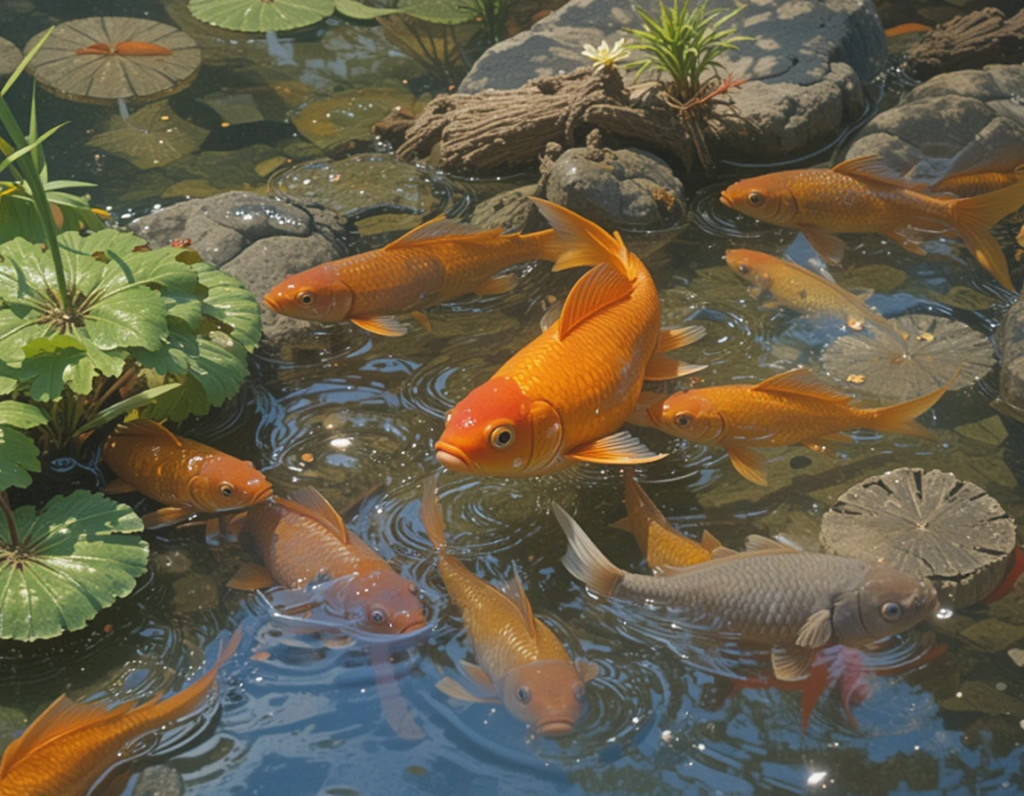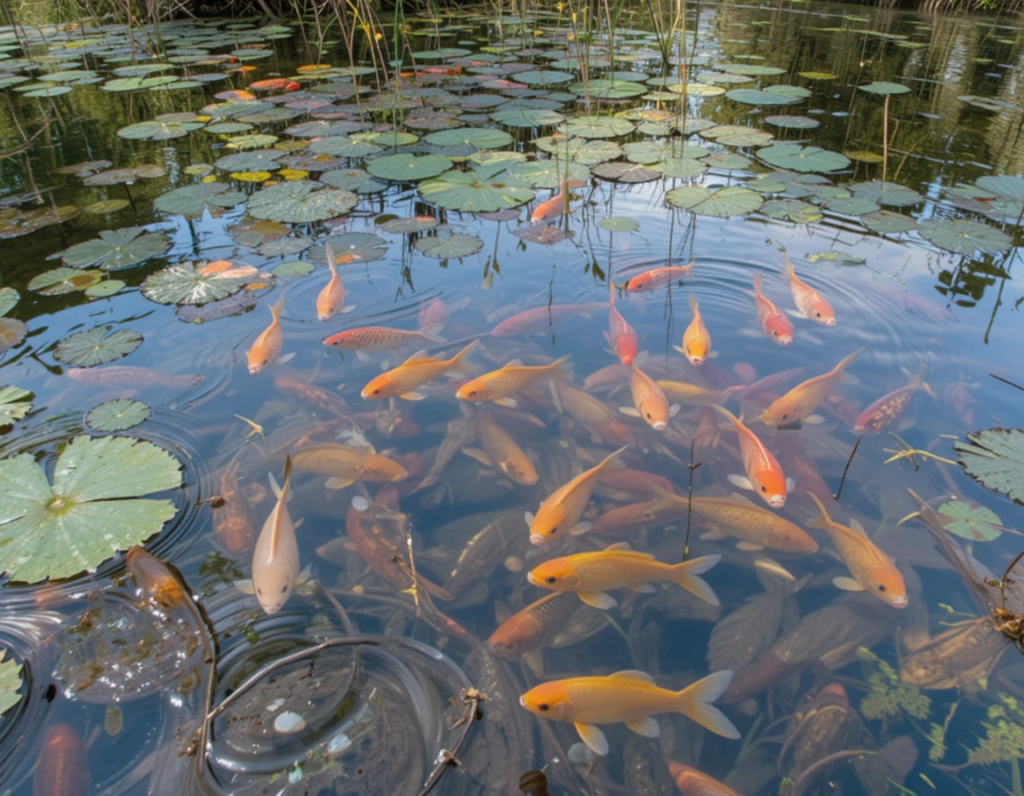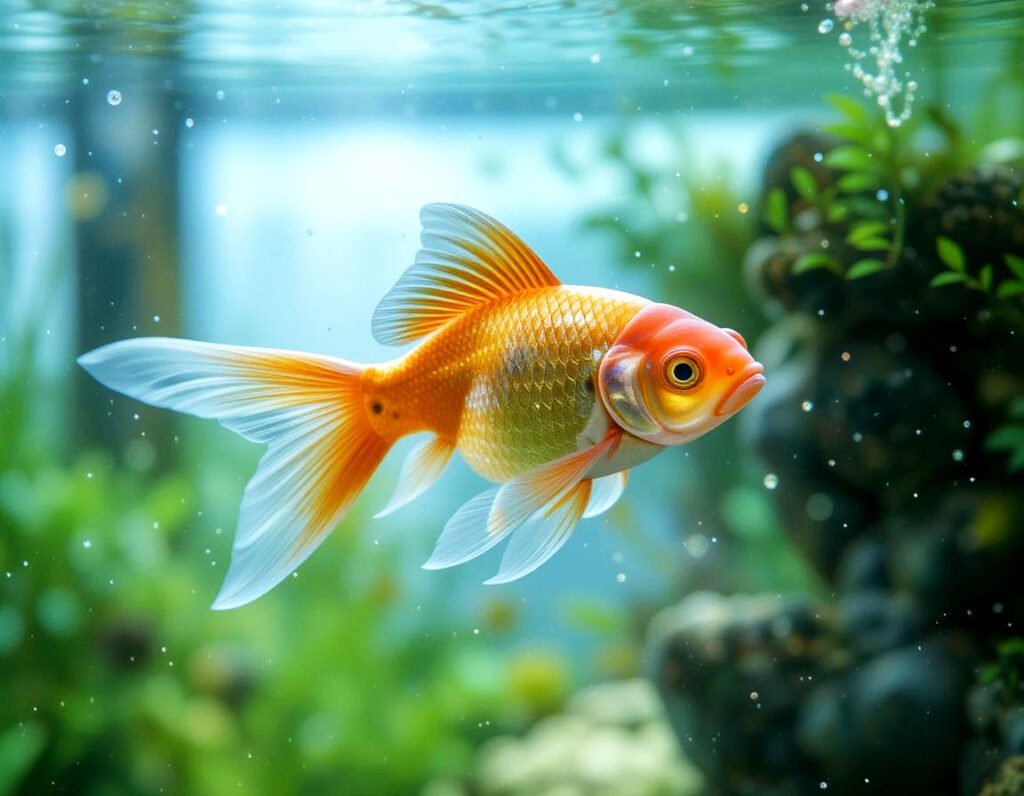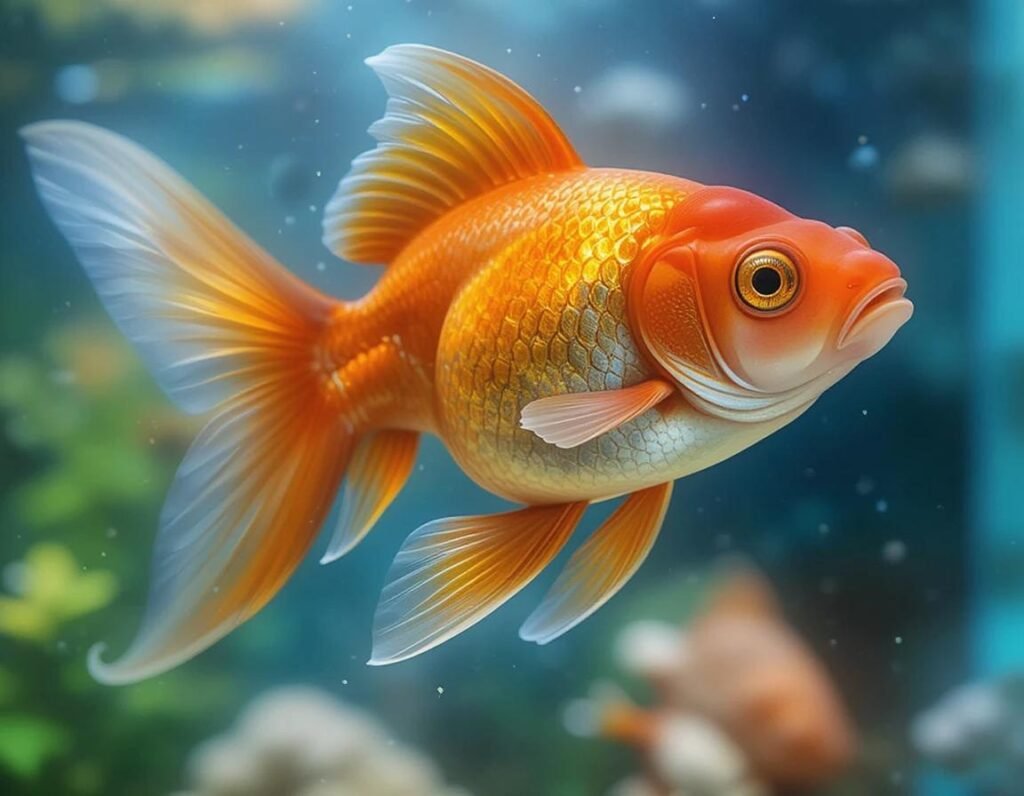
If you’ve ever wondered if your goldfish could take the plunge into a pond instead of staying cooped up in an aquarium, you’re in the right place! The idea of moving your goldfish from a small tank to a large pond is tempting, and let’s be honest, your goldfish could probably use the extra space to stretch its fins. But, before you make the leap (pun intended), let’s talk about whether goldfish can live in a pond, and how to give them the best possible life in the great outdoors.
1. The Short Answer: Yes, Goldfish Can Live in a Pond!
Goldfish are quite the adaptable little swimmers, and they can thrive in outdoor ponds, provided certain conditions are met. In fact, many goldfish owners move their pets into a pond to allow them to grow larger and enjoy more room to swim around. They don’t need a lot of pampering, but they do need the right environment.
However, just like any great adventure, moving your goldfish to a pond requires some prep work. Don’t just toss your goldfish into a random backyard pond and hope for the best. No, no—there’s a bit more to it than that.
2. Why Ponds Are a Great Option for Goldfish
A pond can be an excellent home for your goldfish for several reasons:
- Space to Grow: Goldfish can grow pretty big in ponds, sometimes reaching 12-14 inches in length. In a pond, they have all the room they need to grow, and they’ll be a lot happier for it. It’s like moving from a cramped apartment to a spacious house—who wouldn’t be happy about that?
- Natural Filtration: Ponds have natural filtration from plants, rocks, and the general ecosystem. While you’ll still need to check the water quality from time to time, nature will help with the filtration process.
- Cooler Temperatures: Goldfish are cold-water fish, and ponds offer the perfect temperature range, especially if you live in a mild climate. No need for a heater, just make sure the water doesn’t get too warm in the summer months.
More Room to Swim: Let’s face it—goldfish are social creatures that love to explore. A pond allows them to swim around, chase some bubbles, and live their best life.
3. Things to Consider Before Moving Your Goldfish to a Pond
While ponds are a great option, there are a few things you should keep in mind to make sure your goldfish has the best possible life:
Water Quality:
You may have heard this before, but water quality is key! Goldfish produce a lot of waste, and that can lead to poor water quality if the pond isn’t properly maintained. You’ll need to ensure the water is regularly cleaned and filtered. Also, check the pH levels to make sure the water is suitable for goldfish (they prefer slightly alkaline water with a pH between 7.0-8.4).
Pond Size:
Goldfish might start small, but they grow, and they grow fast! To keep your fish happy, your pond should be at least 200 gallons for a few goldfish. The bigger the pond, the better—it gives your fish room to swim around without feeling cramped. Plus, a larger pond can handle more fish and provide better water quality overall.
Temperature:
Goldfish are cold-water fish and do not need heaters, but make sure your pond doesn’t freeze solid during the winter. If you live in a place where the winters are harsh, you’ll need to make sure the pond is deep enough to keep the water from freezing all the way to the bottom. Goldfish can survive in the cooler depths where the water stays liquid, even when the surface freezes.
Predators:
Let’s not sugarcoat it—your goldfish are delicious to certain predators, such as herons, raccoons, and cats. To keep your goldfish safe, consider adding some pond netting or creating a pond design that offers hiding spots (think rocks and plants) for your fish. Just because they’re in a pond doesn’t mean they’re in a fortress.
4. What Goldfish Need in a Pond
Just because your goldfish is swimming in a pond doesn’t mean it doesn’t still need a bit of TLC! Here’s what your goldfish will need to thrive:
- Oxygenated Water: Make sure your pond is properly aerated. Goldfish need oxygen, and it’s even better if your pond has plants like water lilies or lotus to provide extra oxygen.
- Pond Plants: Speaking of plants, goldfish actually like to nibble on them (sometimes more than you’d like). While adding plants to your pond is a good idea for natural filtration and shade, be sure to choose goldfish-safe plants like anubias and hornwort. Goldfish will happily munch on these without causing too much damage to your garden.
- Shelter: If your pond is deep enough, provide some shaded areas with plants or pond caves. Goldfish like a bit of privacy when they’re not swimming around showing off their moves.
- Regular Feeding: Goldfish might be in a pond, but that doesn’t mean they’re getting all the food they need from the water. Make sure you’re feeding them a quality goldfish pellet or a balanced diet of vegetables and occasional live food like worms.
5. Goldfish Behavior in Ponds
Goldfish are typically peaceful fish, and they get along well with other goldfish in a pond. If you decide to add more fish to the pond, make sure they’re non-aggressive and can handle the cooler water. Shubunkins, koi, and other goldfish are often great companions for goldfish.
Goldfish are also social, so don’t be surprised if you catch them swimming together in a little school. It’s like a goldfish meet-and-greet, and everyone’s invited!
6. Can Goldfish Live in a Pond Year-Round?
Yes, goldfish can live in a pond year-round—especially if you live in a temperate climate where the winters aren’t too harsh. However, if you live somewhere with freezing temperatures, you’ll need to make sure the pond is deep enough (at least 24-30 inches) to prevent the water from freezing solid. Goldfish can survive the winter in the deeper part of the pond, where it remains liquid.
7. How to Transition Goldfish from a Tank to a Pond
So, you’ve decided to move your goldfish to the pond—congratulations! But how do you make sure the transition goes smoothly without shocking your finned friend?
- Acclimate Slowly: Gradually introduce your goldfish to the new environment. You can start by floating their aquarium bag in the pond for around 15-20 minutes, letting the water in the bag gradually adjust to the pond’s temperature. Then, release them gently into the water. Think of it as a VIP spa day for your fish.
- Check the Water Quality: Before transferring your goldfish to the pond, check the water parameters—pH levels, ammonia, nitrate, and nitrite levels. Ideally, the water in your pond should be free of toxins and have a stable environment. A test kit can save you from a fishy disaster.
- Start with One Fish: If you have multiple goldfish, consider starting with just one or two fish in the pond first. This gives you time to monitor how the pond is supporting them before you add more.
8. How Long Can Goldfish Live in a Pond?
With proper care, goldfish in a pond can live anywhere from 10 to 20 years—that’s a lot of time for your fish to swim around, make new friends, and grow to massive sizes (the neighborhood will probably know them by name). If you want your goldfish to live the longest and happiest life possible, make sure the water stays clean, they’re fed regularly, and predators stay out of the pond. Also, don’t forget about winter care—cold climates can pose a threat if you don’t manage the pond temperature.
9. What to Do If Your Goldfish is Acting Strange in the Pond
Even though goldfish are pretty tough cookies, they’re not immune to feeling off every now and then. If your goldfish is swimming erratically, staying at the bottom of the pond, or looking like they’ve had one too many bad sushi nights, it’s time to investigate:
- Check the Water Quality: Poor water quality is often the culprit. High levels of ammonia or nitrates can make your fish feel sick. Use a pond water test kit to make sure everything is in balance.
- Temperature Shock: A sudden temperature change (like a cold snap) can stress out your fish. If it’s too warm in the summer or freezing in the winter, your fish may not enjoy the pond as much. Consider adding a pond heater or cooling system depending on the season.
- Predators or Stress: Sometimes, the issue might be that your goldfish is stressed out from lurking predators, or maybe your other pondmates are bullying them. Make sure there are plenty of hiding places for them to escape to.

Conclusion: Goldfish + Pond = Perfect Match?
In short, yes, goldfish can live in a pond and actually thrive there—especially if you take the time to provide a suitable environment. With the right water quality, space, temperature, and protection from predators, your goldfish will enjoy swimming in a pond just as much as you enjoy watching them. It’s a win-win for both fish and owner. Just remember, a happy goldfish in a pond is a fish with room to grow, explore, and enjoy its life in the great outdoors.
FAQs About Can Goldfish Live in a Pond
1. Can goldfish live in a pond year-round?
Answer: Yes, goldfish can live in a pond year-round, provided the pond is deep enough (at least 24-30 inches) to prevent it from freezing solid in winter. Goldfish are cold-water fish and can survive in cool water temperatures. Just make sure the pond doesn’t freeze all the way through, and they’ll be happy to stick around.
2. How big do goldfish get in a pond?
Answer:Goldfish have plenty of room to grow in a pond! They can reach up to 12-14 inches in length, and sometimes even bigger, depending on the size of the pond. In contrast, in smaller tanks, they tend to stay much smaller. A pond gives them the space to really spread out!
3. Do goldfish need a filter in a pond?
Answer:While ponds have natural filtration systems, it’s still a good idea to install a pond filter to maintain the water quality. Goldfish produce a lot of waste, and a filter helps keep the pond water clean, preventing harmful toxins like ammonia and nitrites from building up.
4. What temperature is best for goldfish in a pond?
Answer:Goldfish prefer water temperatures between 65°F to 72°F (18°C to 22°C). They can survive in cooler water, but extreme temperatures (like very hot summers or freezing winters) can stress them out. If your pond temperature fluctuates, consider adding a pond heater in winter or a cooling system in summer.
5. Can I keep other fish with goldfish in a pond?
Answer:Yes! You can keep other cold-water fish, such as koi or shubunkins, with your goldfish in the same pond. However, make sure they’re not aggressive and that they can thrive in similar water conditions. Goldfish get along best with peaceful companions.
6. Will my goldfish survive outdoor predators in a pond?
Answer:Unfortunately, goldfish can be a tasty snack for predators like herons, raccoons, or cats. To keep them safe, consider using pond netting or placing rocks and plants in the pond to offer hiding spots. Also, making sure your pond is deep enough helps keep your fish safe from predators lurking at the surface.
7. Do I need to feed my goldfish in a pond?
Answer:While goldfish might nibble on plants or small organisms in the pond, it’s still important to feed them regularly. Make sure they get a balanced diet of high-quality goldfish pellets or vegetables. Feeding them in the winter is less important, but they’ll need food during the warmer months when they’re more active.
8. How often should I clean my pond if I have goldfish?
Answer:Goldfish are messy eaters, so it’s important to regularly clean your pond to maintain water quality. You’ll need to do partial water changes every few weeks, remove any debris, and clean the filter regularly. How often depends on the size of your pond and how many fish you have, but a clean pond means happy fish!
9. Will my goldfish breed in the pond?
Answer:Yes! Goldfish often breed in outdoor ponds, especially in the spring when temperatures warm up. If you have both male and female goldfish, you might end up with a few baby goldfish (called fry) swimming around. If you’re not ready for a goldfish baby boom, you might want to control the breeding with a pond net.
10. Can goldfish live in a small pond?
Answer:While goldfish can survive in smaller ponds, they will thrive better in larger ones. A pond size of at least 200 gallons is ideal for goldfish, as it provides enough space for them to grow and swim around. Smaller ponds can quickly become overcrowded, which can lead to poor water quality and stressed fish.


